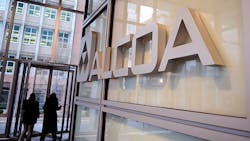Alcoa Plans to Shift Debt to New Company After Split
Alcoa Inc., the prominent aluminum company dividing itself in two, plans to move some debt to its new mining and smelting company in an effort to bolster the credit rating of the remaining manufacturing entity.
The upstream company, which will become Alcoa Corp. by the end of the year, will borrow about $1 billion and return “a substantial portion” to the engineering and fabricating company, to be renamed Arconic, the New York-based company said Wednesday in a filing. Alcoa Corp. will get a revolving credit facility of as much as $1.5 billion.
If the full $1 billion were returned to Arconic for debt repayment, it would end up with about $7 billion of the current company’s $8.3 billion of debt. On Sept. 29, the day after the split was announced, Alcoa had said it intended for all of the combined company’s debt to be retained by Arconic, which is to maintain the current company’s legal identity.
The division of debt and other liabilities is critical in determining whether Klaus Kleinfeld, Alcoa’s chairman and CEO, will be able to execute on his plan to create a self-sufficient metal-producing company and achieve an investment-grade credit rating at the leaner industrial company that will remain.
Alcoa described the allocation of liabilities in a filing today. Each business will maintain a presence in New York, where Alcoa is headquartered, as well as Pittsburgh, where the company has its operations center. Alcoa Corp. will take about $2.1 billion of post-employment benefit obligations in the separation, while Arconic will hold as much as a 19.9% stake in the new Alcoa, according to the filing.
Kleinfeld said in September that the largest U.S. aluminum company would split off its smelters, mines and power assets into a stand-alone entity that will keep Alcoa’s name. Alumina Ltd., Alcoa’s joint-venture partner in Australia, took action in U.S. courts to prevent Alcoa from proceeding with the split without Alumina’s consent.
Alcoa invented the aluminum industry more than a century ago and grew, at its height, to become the world’s biggest producer of the lightweight, rustproof metal. In the past decade, a global glut and protracted downturn in aluminum prices left Alcoa’s smelters struggling to compete as Chinese companies relentlessly boosted output. The price of aluminum has tumbled more than 50% from a 2008 peak.
The split marks the culmination of a strategy pursued by Kleinfeld since taking the reins at the company that year. The former Siemens AG CEO has relentlessly emphasized Alcoa’s focus on value-added products while rationalizing the commodity-aluminum business.
The company’s bonds have returned 4% since last year’s split announcement, less than half of the average gain by debt issued by mining and metals companies. Its shares are up about 2.9% in the same period, compared with a 13% average increase by miners and a 5.4% advance by the S&P 500 Index.
By Sonja Elmquist
About the Author
Bloomberg
Licensed content from Bloomberg, copyright 2016.
